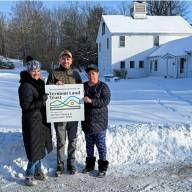Duxbury residents will soon be asked to weigh in on a management plan for the town’s 169-acre town forest. The town forest committee is working on completing the management plan and will bring it to the public for comment at the end of June.
The Duxbury Select Board recently reviewed the draft document. Duxbury Select Board member and town forest committee member Jamie Ervin said that the report and a public hearing is required as part of the easement for the town forest.
The forest is made up of two parcels on Hart Road which were transferred to town ownership in 2017. The process of establishing the Duxbury Town Forest was a collaborative effort between the town, the Vermont Department of Forests, Parks and Recreation (FPR), and the Duxbury Land Trust (DLT). In 2010, FPR approached the DLT about the possibility of transferring two parcels of state-owned land at the end of Hart Road: the Father Logue property and the "hospital block" of Camel’s Hump State Park. The town's residents expressed interest, and in 2015, a Town Meeting vote approved the acceptance of the land.
The Vermont State Hospital, established in 1865 in Waterbury, was one of the state's primary institutions for the mentally ill. Over time, the hospital expanded its operations to include agricultural endeavors, leading to the acquisition of several farms across Vermont. The Duxbury property, which includes the Father Logue Camp and adjacent lands, was part of this agricultural initiative. Patients at the hospital were involved in farming activities, producing food to sustain the institution and its staff.
In the 1970s, as the hospital's operations evolved and the need for agricultural operations diminished, the state began divesting itself of these properties. In 1973, an executive order transferred the majority of the Duxbury land from the Vermont State Hospital to the Department of Forests and Parks, marking the beginning of its transition from institutional use to public conservation land.
The conservation easement on the land is held by the Duxbury Land Trust to ensure the land's preservation for forestry, conservation, and passive recreation in perpetuity.
“This is due diligence and there have been people camping there and there weren’t signs saying people shouldn’t camp. There were problems with trails being washed out. This is a town asset, and we have to have parking and trails, and we have to have some rules about what you do,” Ervin said.
The draft management plan clarifies and affirms the terms of the easement. It identifies the primary purpose of the town forest as being for residents to use for forestry, conservation, and recreation purposes.
“The primary purpose of the forest is to conserve productive forestry lands so as to facilitate productive, sustainable,d economically viable forestry uses, while protecting natural resources and public access. Other important purposes include conserving wildlife habitat, native flora and fauna, streams, wetlands, and scenic and open spaces; as well as allowing public access and dispersed, non-commercial public recreation and education opportunities,” the draft document reads.
The document spells out permitted recreational uses including hiking, walking, skiing, snowshoeing, running and other pedestrian activities. Swimming in the pond is allowed along with hunting/trapping and fishing with conditions. Overnight stays of any kind are not permitted, nor is mountain biking, horseback riding or skating. No commercial activities are allowed.
Ervin said the town forest committee spent time discussing possible uses in the forest and some of the work was harder than anticipated.
During the work of creating the draft, members of the committee asked themselves ‘do we log our town forest?’ They opted not to log after they got an opinion from a professional forester who asked them to consider how they feel about the forest and what the forest is for.
Given the current national and state climate that fosters logging and in some cases in Vermont, logging 150-year-old forests that sequester carbon, the Duxbury committee took a different tact. While the push to log enormous tracts of lands continues, in Duxbury, for now the town forest will not be logged, other than for forest health.
“It’s more complicated than you might assume. The complicated part arises when you have social use of a town forest. Do we allow hunting trails and what kind of trails. It’s complicated because towns are complicated and what a town wants depends on who shows up for a small meeting,” Ervin added.













